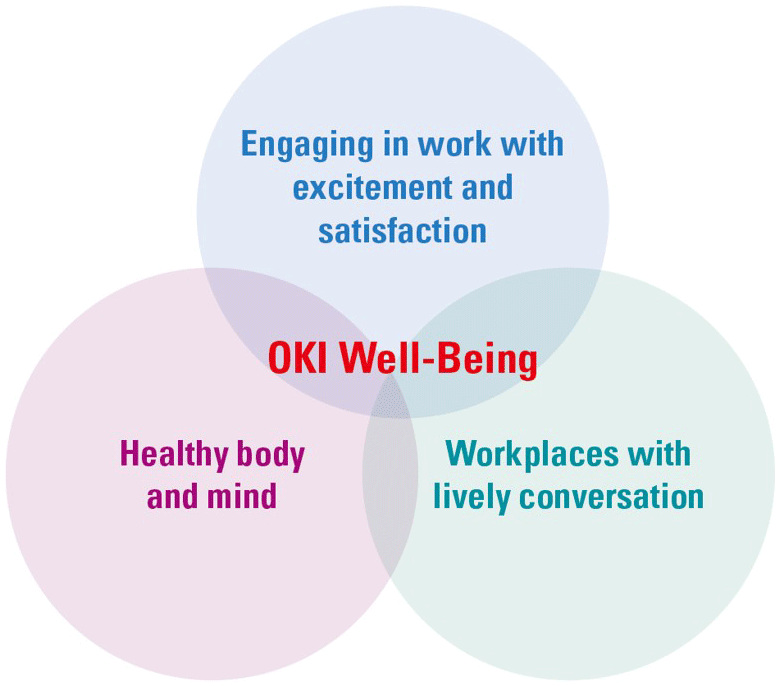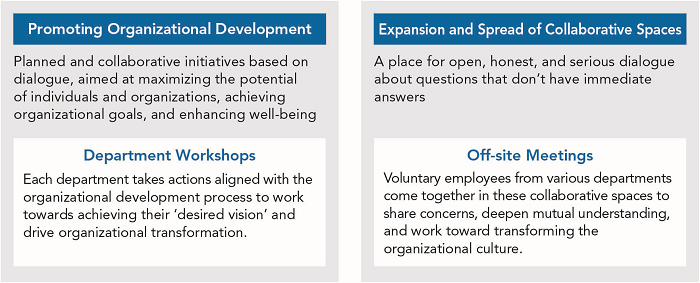- Home
- Sustainability
- Social
- Human Resources Management
- Initiatives for Fostering an Organizational Culture Where Employees Can Proactively Take on Challenges
Sustainability
Social
Human Resources Management Initiatives for Fostering an Organizational Culture Where Employees Can Proactively Take on Challenges
Initiatives for Fostering an Organizational Culture Where Employees Can Proactively Take on Challenges

Aiming to improve each employee's ease of work and sense of fulfillment, we define the state where "a psychologically safe workplace," "mental and physical health," and "the cultivation of work engagement" are realized as 'OKI Well-Being', and are working on creating an environment where diverse talents can positively take on challenges. In particular, focusing on the organization, we are undertaking initiatives to foster a corporate culture that encourages positive challenges and to enhance organizational performance.
With regard to "fostering of job satisfaction," the goal is to increase the percentage of positive responses(*) to 70% by fiscal year 2025 for items related to job satisfaction (OKI work engagement) in the awareness survey conducted annually among all Group employees in Japan.
| target | FY2023 | |
|---|---|---|
| Positive response rate for the "job satisfaction (workplace is positive and work is rewarding)" item in the internal survey for all OKI Group employees in Japan | 70% | 53% |
Elements of OKI Well-Being and Major Efforts to Achieve Them
| Elements of "OKI Well-Being" | Initiatives |
|---|---|
| Workplaces offering psychological safety (Workplaces with lively conversation) |
Activities to promote interactive communication among employees |
| Mental and physical health (Healthy body and mind) |
Health and safety as well as health management(*) |
| Fostering of job satisfaction (Engaging in work with excitement and satisfaction) |
Initiatives to assign the right people to the right positions as well as to align organizational goals with employees' autonomous career visions |
Organizational Development based on Dialogue
To foster a culture where employees can take on challenges proactively, we are encouraging behavioral change among all employees through organizational development activities conducted by each organizational unit, based on open and transparent dialogue, as well as through cross-organizational initiatives such as collaborative spaces designed for exploration and growth.

Aiming for a Workplace with Psychological Safety and Conversation
The OKI Group has been developing "Interactive Communication" activities among employees since fiscal year 2018 under the motto "Express yourself, encourage others to express themselves, and listen" to foster an organizational culture with psychological safety in which employees feel secure to express their opinions and ideas, recognize each other, and take on challenges. Targeting communication at all levels, each workplace holds lunch meetings, team conversations, and workshops on workplace issues and concerns.
Improving Organizational Performance Through Diversified Management Roles
A new grading system has been introduced for management positions, dividing roles into three categories based on responsibilities. Management roles now consist of: (1) Management positions, where individuals serve as team leaders focused on maximizing organizational performance, (2) Professional positions, which take the lead on key organizational challenges and value creation, and (3) Expert positions, responsible for specialized tasks. This clear definition of roles and responsibilities is aimed at strengthening organizational performance.
In addition, in order to create a workplace environment in which anyone can demonstrate performance and play an active role regardless of age, we have promoted the appointment of younger employees to management positions and abolished the "retirement age system," which uniformly dismisses employees from positions such as department head and section head when they reach a certain age. To promote the participation in the workplace of senior employees (employees who have continued to work after retirement age), we are supporting the development of their second careers through the implementation of new mindset training when reaching programs retirement age and enhancing dialogue at career design interviews.
Managerial Positions and Roles under the New Grading System
| Management Position | Professional Position | Expert Position |
|---|---|---|
| As line managers, they are responsible for driving organizational performance and developing talent to lead the future. | These leaders take charge of important issues and value creation in the organization and set their own goals to achieve them. | They lead the resolution of organizational issues and perform specialized work and project management. |
Reports on misuse of public research funds and misconduct related to research
activities can also be filed from the page that opens when you click the above button.
